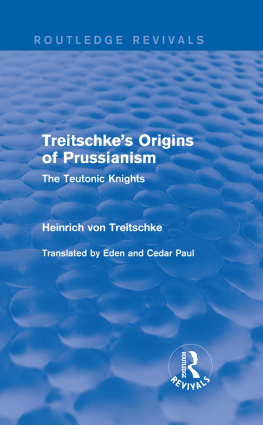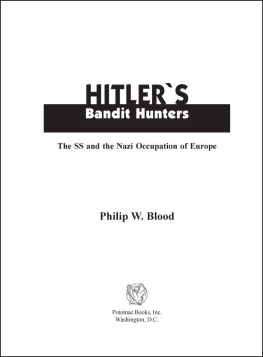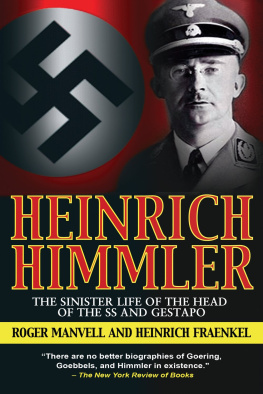
Theatre in Europe Under German Occupation
The Second World War went beyond previous military conflicts. It was not only about specific geographical gains or economic goals, but also about the brutal and lasting reshaping of Europe as a whole.
Theatre in Europe Under German Occupation explores the part that theatre played in the Nazi war effort. Using a case-study approach, it illustrates the crucial and heavily subsidised role of theatre as a cultural extension of the military machine, key to Nazi Germanys total-war doctrine. Covering theatres in Oslo, Riga, Lille, d, Krakau, Warsaw, Prague, The Hague and Kiev, Anselm Heinrich looks at the history and context of their operation; the wider political, cultural and propagandistic implications in view of their function in wartime; and their legacies.
Theatre in Europe Under German Occupation focuses for the first time on Nazi Germanys attempts to control and shape the cultural sector in occupied territories, shedding new light on the importance of theatre for the regimes military and political goals.
Anselm Heinrich is Senior Lecturer in Theatre Studies in the School of Culture and Creative Arts, University of Glasgow.
First edition published 2018
by Routledge
2 Park Square, Milton Park, Abingdon, Oxon, OX14 4RN
and by Routledge
711 Third Avenue, New York, NY 10017
Routledge is an imprint of the Taylor & Francis Group, an informa business
2018 Anselm Heinrich
The right of Anselm Heinrich to be identified as author of this work has been asserted by him in accordance with sections 77 and 78 of the Copyright, Designs and Patents Act 1988.
All rights reserved. No part of this book may be reprinted or reproduced or utilised in any form or by any electronic, mechanical, or other means, now known or hereafter invented, including photocopying and recording, or in any information storage or retrieval system, without permission in writing from the publishers.
Trademark notice: Product or corporate names may be trademarks or registered trademarks, and are used only for identification and explanation without intent to infringe.
British Library Cataloguing-in-Publication Data
A catalogue record for this book is available from the British Library
Library of Congress Cataloging-in-Publication Data
Names: Heinrich, Anselm, author.
Title: Theatre in Europe under German occupation / Anselm
Heinrich.
Description: Abingdon, Oxon ; New York : Routledge, 2017. |
Includes bibliographical references.
Identifiers: LCCN 2017006869| ISBN 9781138799523 (hardback) |
ISBN 9781138799530 (pbk.) | ISBN 9781315756004 (ebook)
Subjects: LCSH: TheaterEuropeHistory20th century. |
EuropeHistoryGerman occupation, 19401945. |
GermanyForeign relationsEurope. |
EuropeForeign relationsGermany.
Classification: LCC PN2595 .H45 2017 | DDC 792.094dc23
LC record available at https://lccn.loc.gov/2017006869
ISBN: 978-1-138-79952-3 (hbk)
ISBN: 978-1-138-79953-0 (pbk)
ISBN: 978-1-315-75600-4 (ebk)
Typeset in Times New Roman
by Apex CoVantage, LLC
Fr Caroline
My thanks go to the Royal Society of Edinburgh for awarding me three research grants under their bilateral agreements scheme for research in Prague (in cooperation with the Czech Academy of Sciences), in d (in co-operation with the Polish Academy of Sciences) and in Ljubljana (in co-operation with the Slovenian Academy of Arts and Sciences). The Herder Institute for Research into East and Central European History in Marburg awarded me a research fellowship in 2014, for which I am enormously grateful. I am also indebted to Harvard University for awarding me the John M. Ward Fellowship in Dance and Music for the Theatre, which allowed me to research and write at Harvards Houghton Library throughout June 2016.
I would like to thank staff at various archives and collections across Europe, and in particular Espen Anderson at the National Archives of Norway in Oslo, Claire-Marie Grosclaude in Lille, Vlasta Mnkov and Pavel Baudisch in Prague, Igor Zemlji and Mojca orn in Ljubljana, Ina Alber in Marburg, and Monique Duhaime and Dale Stinchcomb at the Houghton and Widener libraries at Harvard.
Thanks go to my students as well as my friends and colleagues in theatre studies at the University of Glasgow, namely Michael Bachmann, Cara Berger, Minty Donald, Graham Eatough, Stephen Greer, Dee Heddon, Carl Lavery, Simon Murray, Vicky Price and Tony Sweeten, as well as former colleagues Katie Gough and Adrienne Scullion. Michael Bachmann and Carl Lavery provided succinct feedback on earlier drafts of this book. I thank the universitys College of Arts and School for Culture and Creative Arts for generously awarding me two semesters of research leave, and Dimitris Eleftheriotis in particular. I would also like to thank Debbie Lewer, Elwira Grossman, Alan Jones and Barbara Kaulbach (all in Glasgow); Peter Brod, Michael Wgerbauer, Jitka Ludova and Lenka Jungmannov (Prague); Magorzata Leyko and Karolina Prykowska-Michalak (d); Matjaz Birk and Sandra Jenko (Ljubljana); Moritz Bnemann and Benedikt Stuchtey (Marburg); Evelyn Anuss (Berlin); Veronika Zangl (Amsterdam); Tracy Davis (Chicago); Peter W. Marx (Cologne); Jeffrey Richards (Lancaster); Kate Newey (Exeter); John London and Philippe Sands QC (London); Thomas Hpel (Leipzig); Volker Mohn (Dsseldorf); Paul S. Ulrich and Alexander Weigel (Berlin); Rebecca Rovit (Lawrence/Kansas); Gerwin Strobl (Cardiff); Thomas Kssens (Schwerte); Christoph H. Mller (Kiel); Wolfram van Well (Krefeld); and Karin und Otto Bnemann (Dortmund) for suggestions, feedback and comments. I am grateful to Magorzata Leyko, Monika Wsik and Horst Fassel for allowing me to use previously unpublished material for this study. And, last but not least, I am indebted to Ben Piggott at Routledge, who commissioned this study I thank him and the publisher for their trust in me.
I thank my parents, Gerlinde and Carl-Joachim Heinrich, for their unwavering interest in all my research endeavours, and my family my wife, Anne, and our daughters, Lili, Nellie and Thea for their understanding, interest and love. I dedicate this book to my sister Caroline, the Walter Benjamin expert who knows his ber den Begriff der Geschichte better than anyone and who nudged me towards using this text more. At every stage of this project she was keenly interested in my research, made a number of crucial suggestions and asked the right questions.
Chapter 1
Introduction
In 1943, four years into the Second World War, eminent theatre scholar and devout National Socialist Heinz Kindermann outlined the role German theatre was supposed to play during the conflict:
At all those places where German culture now gains a foothold or where the old German cultural soil is newly farmed, it is not only German factories and schools, which are being built, but also German theatres. German actors, directors and set designers travel to The Hague, to Cracow and into the Ukraine; they go from Oslo to Athens. Everywhere German theatre represents German culture, German manners and German language to the outposts of German labour and military force, but it also speaks to Germanys friends from other nations.








